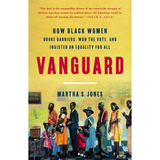


Vanguard: How Black Women Broke Barriers, Won the Vote, and Insisted on Equality for All
- By Martha S. Jones
- Paperback: 352 pages
- Features a bookplate signed by Martha S. Jones
-
In Vanguard, historian Martha S. Jones rewrites the history of American democracy by recounting the political lives of African American women in the United States. Drawing on deep archival research, Jones reveals a powerful tradition of political activism that challenged exclusion and expanded the meaning of citizenship. Meticulously researched and compellingly written, the book provides a more comprehensive and nuanced picture of the struggle for equality. An essential addition for readers interested in American history, civil rights, and the ongoing pursuit of democracy.
-
In the standard story, the suffrage crusade began in Seneca Falls in 1848 and ended with the ratification of the Nineteenth Amendment in 1920. But this overwhelmingly white women’s movement did not win the vote for most black women. Securing their rights required a movement of their own. The Voting Rights Act was signed into law on August 6, 1965, by President Lyndon Johnson. It outlawed the discriminatory voting practices adopted in many southern states after the Civil War, including literacy tests as a prerequisite to voting. An act to enforce the Fifteenth Amendment to the Constitution of the United States, the Voting Rights Act is part of the records in the holdings of the National Archives.